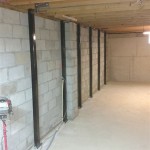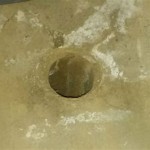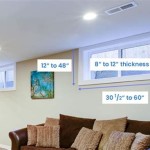Essential Aspects of Checking for Mold in Your Basement
Basements are valuable additional spaces in homes, often used for storage, recreation, or as living areas. However, basements are also prone to moisture and humidity, creating a favorable environment for mold growth. Mold can pose health risks and damage your property, so it's crucial to be vigilant about checking for its presence and taking prompt action if necessary.
Here are some essential aspects to consider when checking for mold in your basement:
Signs of Mold Growth
Early detection is key to prevent significant damage from mold growth. Familiarize yourself with common signs that indicate mold's presence:
- Visible mold growth: Look for dark, fuzzy patches that may appear greenish, black, or white.
- Musty or moldy odor: A musty or unpleasant smell in the basement could indicate mold growth.
- Condensation or water damage: Check for signs of water leaks, condensation, or dampness, which create favorable conditions for mold.
- Health symptoms: Persistent allergy-like symptoms, such as sneezing, coughing, or irritated eyes, can sometimes be linked to mold exposure.
Inspection and Detection
To thoroughly check for mold in your basement, consider the following steps:
- Visual inspection: Examine surfaces such as walls, ceilings, pipes, and HVAC systems for mold growth or signs of water damage.
- Moisture meter: Use a moisture meter to detect hidden moisture or dampness that could promote mold growth.
- Professional inspection: If you suspect mold growth extends beyond visible areas or have health concerns, consult a mold inspector for a comprehensive assessment.
Testing for Mold
Confirming the presence of mold and its type can help guide appropriate remediation steps. Consider these testing methods:
- Swab or tape sample: Collect samples from suspected moldy areas using swabs or specialized tape.
- Air sample: Test the air quality in your basement to determine mold spore levels.
- Professional laboratory analysis: Send samples to a laboratory for expert analysis to identify mold species and levels.
Health Implications of Mold
Mold spores can trigger allergic reactions and respiratory problems, particularly in individuals with allergies or asthma. Prolonged exposure to high levels of mold can also lead to more severe health complications.
Preventing Mold Growth
Implement these measures to minimize the risk of mold growth in your basement:
- Moisture control: Ensure proper ventilation, fix leaks promptly, and use a dehumidifier to keep humidity levels low.
- Basement sealing: Seal cracks and gaps around windows, doors, and pipes to prevent water intrusion.
- Mold-resistant materials: Use mold-resistant drywall, paint, and other building materials to inhibit mold growth.
Mold Remediation
If mold growth is confirmed, it's crucial to address the issue promptly to prevent further damage and health risks:
- Small areas: For small, localized mold growth, clean the affected area with a bleach solution or commercial mold cleaner. Ensure adequate ventilation.
- Extensive growth: If mold growth covers large areas or has spread into building materials, professional remediation may be necessary to safely remove and prevent its recurrence.
Remember, addressing mold issues in your basement requires a proactive and vigilant approach. By being aware of the signs of mold growth, inspecting regularly, testing if necessary, and taking appropriate preventive and remediation measures, you can keep your basement a safe and healthy space.

Testing For Mold When Should You Test Are Home Kits Accurate

How To Detect Household Mold

What You Need To Know About Mold From Basement Flooding

How To Remove Mold From Basement Walls In 2024

10 Ways To Prevent Mold In The Basement

Toronto Homeowners How To Test For Mold In Your Home Restoration Mate

Removing Mold In Your Basement 5 Steps Woodard

Simple Preventative Tips To Keep Mold And Mildew Out Of Your Basement Waterproof Com

How To Remove Mold Black In Basement

The Truth Mold In Basements
Related Posts







